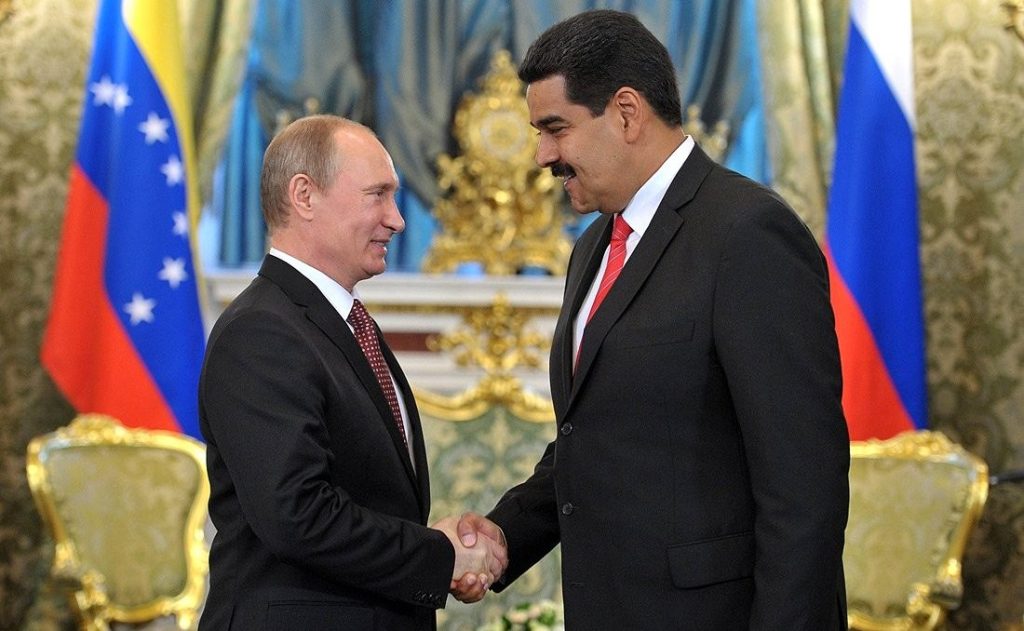IN THE MEDIA
What are Russia, Iran and Cuba doing in Venezuela?
June 6, 2019 | Oved Lobel

The Strategist (ASPI) – 6 June 2019
When about 100 Russian servicemen and military equipment were reportedly flown into Venezuela in late March, US President Donald Trump’s response was to declare that ‘Russia has to get out’. Moscow refused, saying that the troops would stay ‘as long as needed’ and that they were only there to repair equipment, such as Venezuela’s Russian-made S-300 air-defence system. Russia has denied the recent reports that it had told the US that it was pulling defence personnel out of Venezuela.
Amid the continuing political, economic and humanitarian meltdown of Venezuela, an anti-American alliance consisting of Russia, Cuba and Iran is coalescing to counter US economic and diplomatic pressure on embattled President Nicolas Maduro. The anchor of the alliance is Cuba, which colonised Venezuela through its security services when Fidel Castro’s protege Hugo Chavez came to power in 1998.
Castro then began shipping tens of thousands of barrels of oil a day back to Cuba, while Venezuela became what is widely considered a ‘mafia state’. He also expanded his relationships with the narco-terrorist insurgencies plaguing the region, most famously FARC and the National Liberation Army in Colombia. Cuba’s security services helped stand up loyalist paramilitary organisations called colectivos to terrorise opponents of the Maduro regime. More recently, Cuba assisted in creating the Special Actions Force, or FAES, which strikes at opposition figures.
But Cuba is not alone. It cooperated with its longstanding ally, Iran, to help build security architecture to protect its colony. The expeditionary wing of Iran’s Islamic Revolutionary Guard Corps, the Quds Force, worked alongside Cuban intelligence in Venezuela to consolidate the regime’s hold. Since 2005, Iran has extended €1 billion (A$1.61 billion) in loans to Cuba and is heavily involved in several projects there, including a shared intelligence station to block US radio broadcasts.
A proxy of the Quds Force, Lebanon’s Hezbollah, has also had a close relationship with the Venezuelan regime, which mostly revolves around proceeds from illicit drugs, money laundering and other organised crime to supplement its activities in the Middle East. In an exposé on the US Drug Enforcement Administration’s operation to track and shut down Hezbollah’s global operations, Josh Myer writes that:
[B]eginning in 2007, DEA agents watched as a commercial jetliner from Venezuela’s state-run Conviasa airline flew from Caracas to Tehran via Damascus, Syria, every week with a cargo-hold full of drugs and cash. They nicknamed it ‘Aeroterror,’ they said, because the return flight often carried weapons and was packed with Hezbollah and Iranian operatives whom the Venezuelan government would provide with fake identities and travel documents on their arrival.
The Venezuelan embassy in Iraq was reportedly involved in a similar effort.
In 2010, an unclassified US Defense Department report to Congress on Iranian military power noted an increased Revolutionary Guard presence in Venezuela, and there are now credible reports of a Hezbollah terrorist training camp on Venezuela’s Margarita Island, as well as in Cuba. Maduro recently wrote a letter to Hezbollah secretary-general Hassan Nasrallah thanking him for his support after Nasrallah pledged military and security specialists to preserve his regime. Nasrallah said it was but a ‘small part’ that Hezbollah could offer Maduro and the memory of Chavez in return for the support they gave Hezbollah and Iran, particularly in providing funds for Hezbollah.
Just as worrying to the Americans as the pervasive Iranian presence in Venezuela is the increasing Russian interest in preserving Maduro’s rule. Moscow has almost single-handedly kept Maduro’s regime afloat financially, primarily through the Russian energy company Rosneft, which has used its leverage to take possession of Venezuela’s oil and oil infrastructure in exchange for massive loans. Igor Sechin, Rosneft’s chief executive and one of Russia’s most powerful men, had a close relationship with Chavez and reportedly meets with Maduro regularly.
As demonstrated in Syria, Moscow doesn’t like to let its allies fall, and the troops deployed to Venezuela aren’t the only indicator of increasing Russian military involvement there. In January, Reuters reported that perhaps hundreds of Russian ‘mercenaries’ from the Wagner group—a Russian military intelligence front with a presence in Syria, Ukraine, Sudan, the Central African Republic and possibly Libya—had been deployed to help protect Maduro. The report was published a day after Russia and Iran discussed coordinating their response to the crisis in Venezuela, and Russia is almost certainly leveraging Iranian and Cuban infrastructure to help keep Maduro in power.
In February, for example, Russia granted Cuba a military credit line for €38 million (A$61.25 million), and the Wagner contingent was said to have flown to Venezuela via Havana. There are also reports that Russia is looking to establish new bases in both Cuba and Venezuela, which it denies. In April, Iran opened a direct route to Caracas for Mahan Air, a company that’s been sanctioned in much of the Western world for being a transport system for Quds Force personnel and weapons. Iran’s foreign minister, Javad Zarif, reportedly mooted sending Revolutionary Guard personnel to protect Maduro.
Trump initially seemed to favour military intervention in Venezuela. He has since done a complete about-face, following a mid-May phone call with Russian President Vladimir Putin who he says assured him that Russia ‘is not looking at all to get involved in Venezuela’. The failure of senior US officials to stage-manage Maduro’s overthrow using only sanctions and diplomacy has prompted Trump to lash out at their hawkish rhetoric and false assumptions.
While the current US strategy is simply to maintain sanctions and international pressure and wait out Maduro’s regime, the dynamics set in motion by the US and by Venezuelan opposition leader Juan Guaido could take on a life of their own. Military intervention is extremely unlikely, but any uncalculated escalation or sudden collapse of the regime could inadvertently involve US forces battling Iranian- and Russian-backed Venezuelans in America’s own backyard.
Oved Lobel is a policy analyst at the Australia/Israel & Jewish Affairs Council.





